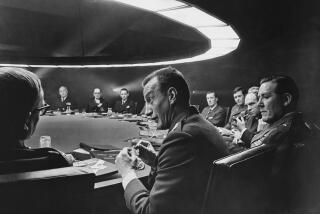Review: ‘All the President’s Men Revisited’ looks back in wonder
“All the President’s Men Revisited,” which premieres Sunday on Discovery Channel, returns us to those thrilling days of yesteryear when everyone read newspapers and the legislative and judicial branches of the U.S. government were capable of acting out of something other than political self-interest and scorched-earth partisan intransigence. No, young people, I am not making that up.
Narrated by executive producer Robert Redford, who produced and starred in “All the President’s Men,” the 1976 film of the 1974 book by Bob Woodward and Carl Bernstein, it is not merely the story of the historical events but of the transformation of those events into a work — a pretty great work — of popular art. News footage alternates with scenes from the movie.
The documentary’s starry cast of commentating conspirators, senators, lawyers, newspeople, pundits and comic-pundits includes Dustin Hoffman, who played Bernstein to Redford’s Woodward. To emphasize the way they worked as a unit, they learned each other’s lines as well as their own and would jump in to finish the other’s thoughts; “Woodstein” was a thing way before Brangelina, et al.
Even as the story was breaking — it began with a burglary at Democratic National Committee headquarters and ended in the Oval Office with three articles of impeachment — and before its implications were well understood, Redford called Woodward at the Washington Post to pitch a movie. (The reception was initially “chilly.”) And if the story of the story gets mixed up with the story itself, here and 40 years ago, that is how history works. Just ask Richard III about William Shakespeare.
President Richard Nixon himself is often called a Shakespearean character, a way of saying it takes a genius to figure him out. The most peculiar thing about it all, as Woodward points out, is that he was popular; even as Watergate ate up the news, he was reelected in a landslide. From the vantage of 2013 it is possible, even for a good, solid liberal (looking slightly off to the side and squinting) to regard his administration with not a small degree of approval. The whole business was pointless but, given Nixon’s paranoia and pathological need to win, in some sense unavoidable.
More a sketch than a thorough retelling — though still recommended as such — and as balanced as you can be about the scandal given the facts, the film begins at the end, or just before it, with the remarkable, once much-bootlegged footage of Nixon preparing to resign, getting a sound level, attempting jokes, unsuccessfully affecting nonchalance. From there it jumps back into a fog of moral blindness and misplaced loyalty that left an administration in tatters and, in some 40 cases, in jail.
Some of the players have achieved distance; others have not: “He was a saint,” says a teary Ben Stein, weirdly, remembering and echoing Nixon’s rambling, wet-faced farewell to the White House staff. (“My mother was a saint,” the soon-to-be ex-president said, apropos of nothing.)
Nixon himself, not surprisingly, never seemed to get it — “If the president does it, that means it’s not illegal,” he told David Frost in their famous interview, though to be fair he is possibly not the last president, nor the first, to have believed that.
The film speculates briefly on how the story would be covered today (answer: differently), with hypothetical visualizations of tweets and Facebook pages. Certainly the story would not belong to two reporters at a single paper, banging away on their typewriters: a sound Redford had amplified for the movie to sound like ordnance, to underline their power.
PHOTOS AND MORE
Roger Ebert: Career in pictures
ENVELOPE: The latest awards buzz
PHOTOS: Greatest box office flops
More to Read
The complete guide to home viewing
Get Screen Gab for everything about the TV shows and streaming movies everyone’s talking about.
You may occasionally receive promotional content from the Los Angeles Times.







